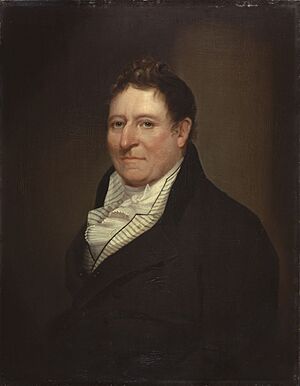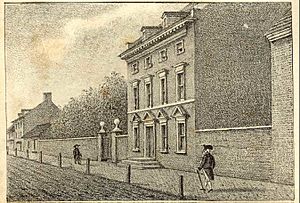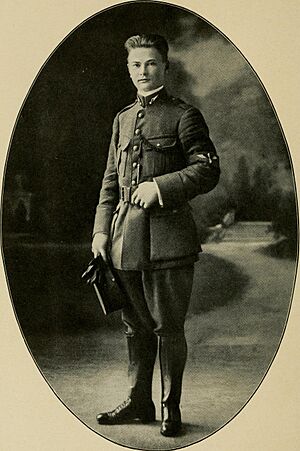Edmond-Charles Genêt facts for kids
Quick facts for kids
Edmond-Charles Genêt
|
|
|---|---|

Portrait by Ezra Ames, between 1809 and 1810
|
|
| Ambassador of France to the United States | |
| In office 1793–1794 |
|
| Preceded by | Jean Baptiste Ternant |
| Succeeded by | Jean Antoine Joseph Fauchet |
| Personal details | |
| Born |
Edmond Charles Genêt
January 8, 1763 Versailles, France |
| Died | July 14, 1834 (aged 71) East Greenbush, New York, U.S. |
| Spouses |
Cornelia Tappen Clinton
(m. 1794; died 1810)Martha Brandon Osgood
(m. 1814) |
| Relations | Jeanne-Louise-Henriette Campan (sister) |
| Parent | Edmond Jacques Genêt |
| Signature |  |
Edmond-Charles Genêt (born January 8, 1763 – died July 14, 1834), also known as Citizen Genêt, was a French diplomat. He was sent to the United States by the French government during the French Revolution. His actions when he arrived in America caused a big problem between the two countries, known as the Citizen Genêt affair. Because of this, President George Washington asked France to call him back home. Genêt feared for his life if he returned, so he asked for protection in America, which President Washington allowed. Genêt lived in the United States until he died. Historians say this event helped people respect the president more and made his role in dealing with other countries stronger.
Contents
Growing Up and Learning
Genêt was born in Versailles, France, in 1763. He was the ninth child of Edmond Jacques Genêt, who worked for the French government in foreign affairs. His father studied the British navy and watched the American Revolutionary War. Genêt's older sister, Jeanne-Louise-Henriette Campan, was a lady-in-waiting to Queen Marie-Antoinette.
Edmond-Charles Genêt was very smart from a young age. By the time he was 12, he could read seven different languages! These included French, English, Italian, Latin, Swedish, Greek, and German.
His Career as a Diplomat
When Genêt was 18, he became a court translator. In 1788, he was sent to the French embassy in Russia to work as an ambassador. Over time, Genêt grew to dislike the old system of kings and queens in France, called the ancien régime. He didn't like any monarchies, including the one in Russia. In 1792, the Russian ruler, Catherine the Great, said Genêt was no longer welcome.
In the same year, a group called the Girondins took power in France. They chose Genêt to be their minister (like an ambassador) to the United States.
The Citizen Genêt Affair

The Citizen Genêt affair started in 1793. Genêt was sent to the United States to get American help for France's wars against Spain and Britain.
Genêt arrived in Charleston, South Carolina, on a French ship on April 8. Instead of going straight to Philadelphia, which was the capital then, to meet President George Washington, Genêt stayed in South Carolina. People in Charleston were very excited to see him and held many parties in his honor.
While in South Carolina, Genêt started to recruit Americans. He armed private ships, called privateers, to attack British ships. He also helped organize American volunteers to fight Britain's Spanish allies in Florida. After gathering support, Genêt traveled towards Philadelphia, stopping along the way to get more people to support France. He arrived in Philadelphia on May 16.
His actions put American neutrality at risk. President Washington had clearly stated that America would stay neutral in the war between France and Britain. When Genêt finally met Washington, he asked America to stop being neutral and help France. Secretary of State Thomas Jefferson told Genêt that his actions were wrong and unacceptable, but Genêt still protested. Meanwhile, Genêt's privateers were capturing British ships, and his volunteers were getting ready to fight the Spanish.
Genêt kept ignoring the U.S. government's wishes. He continued to capture British ships and turn them into privateers. President Washington and his advisors, including Alexander Hamilton and Thomas Jefferson, were very upset. They sent Genêt a long letter complaining about his actions. Genêt replied stubbornly. So, President Washington and his team demanded that France call Genêt back.
By January 1794, a new group called The Mountain had taken power in France. They wanted to arrest Genêt. Knowing he would likely be in great danger if he returned to France, Genêt asked President Washington for protection in the United States. Even though Hamilton had been Genêt's strongest opponent, he convinced Washington to let Genêt stay safely in America.
Life in America
After getting protection from President Washington, Genêt moved to New York. He lived on a farm called Prospect Hill in East Greenbush, overlooking the Hudson River. He lived as a gentleman farmer and even wrote a book about inventions.
Genêt married Cornelia Tappen Clinton in 1794. She was the daughter of New York Governor George Clinton. They had several children. After Cornelia passed away in 1810, Genêt married Martha Brandon Osgood in 1814. She was the daughter of Samuel Osgood, who was the first Postmaster General of the United States.
Genêt died on July 14, 1834. He is buried in a churchyard near his farm.
Family Connections
Edmond Charles Clinton Genet (1896–1917) was Genêt's great-grandson. He was a pilot who fought with the Lafayette Escadrille and was the first American pilot to die in World War I after the United States joined the war in 1917.
His Legacy
- An elementary school in East Greenbush, New York, is named Citizen Genet Elementary School.
- Genêt is shown in the 2008 TV series John Adams, played by Cyril Descours.
See also
- Franco-U.S. relations
 | John T. Biggers |
 | Thomas Blackshear |
 | Mark Bradford |
 | Beverly Buchanan |


